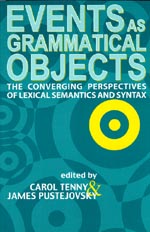Carol L. Tenny and James Pustejovsky
 Researchers in lexical semantics, logical semantics, and syntax have traditionally employed different approaches in their study of natural languages. Yet, recent research in all three fields have demonstrated a growing recognition that the grammars of natural languages structure and refer to events in particular ways. This convergence on the theory of events as grammatical objects is the motivation for this volume, which brings together premiere researchers in these disciplines to specifically address the topic of event structure. The selection of works presented in this volume originated from a 1997 workshop funded by the National Science Foundation regarding Events as Grammatical Objects, from the Combined Perspectives of Lexical Semantics, Logical Semantics and Syntax.
Researchers in lexical semantics, logical semantics, and syntax have traditionally employed different approaches in their study of natural languages. Yet, recent research in all three fields have demonstrated a growing recognition that the grammars of natural languages structure and refer to events in particular ways. This convergence on the theory of events as grammatical objects is the motivation for this volume, which brings together premiere researchers in these disciplines to specifically address the topic of event structure. The selection of works presented in this volume originated from a 1997 workshop funded by the National Science Foundation regarding Events as Grammatical Objects, from the Combined Perspectives of Lexical Semantics, Logical Semantics and Syntax.
Publication Date: April 1, 2001
Tenny, C. and J. Pustejovsky, (eds.) Events as Grammatical Objects, Cambridge University Press. 2000.




 This volume combines “An Introduction to Formal Language ” “Theory” with issues in computational linguistics. The book begins with standard formal language material, including a discussion of regular, context-free, context sensitive, and arbitrary phrase structure languages. This is followed by a discussion of the corresponding families of automata: finite-state, push-down, linear bounded and Turing machines. Important topics introduced along the way include closure properties, normal forms, nondeterminism, basic parsing algorithms, and the theory of computability and undecidability. Special emphasis is given to the role of algebraic techniques in formal language theory through a chapter devoted to the fixed point approach to the analysis of context-free languages. Advanced topics in parsing are also emphasized in an unusually clear and precise presentation. A unique feature of the book is the two chapter introduction to the formal theory of natural languages. Alternative schemes for representing natural language are discussed, in particular ATNs and GPSG. This book is part of the AKM Series in Theoretical Computer Science. “A Basis for Theoretical Computer Science,” also in the series, should provide the necessary background for this volume intended to serve as a text for upper undergraduate and graduate level students.
This volume combines “An Introduction to Formal Language ” “Theory” with issues in computational linguistics. The book begins with standard formal language material, including a discussion of regular, context-free, context sensitive, and arbitrary phrase structure languages. This is followed by a discussion of the corresponding families of automata: finite-state, push-down, linear bounded and Turing machines. Important topics introduced along the way include closure properties, normal forms, nondeterminism, basic parsing algorithms, and the theory of computability and undecidability. Special emphasis is given to the role of algebraic techniques in formal language theory through a chapter devoted to the fixed point approach to the analysis of context-free languages. Advanced topics in parsing are also emphasized in an unusually clear and precise presentation. A unique feature of the book is the two chapter introduction to the formal theory of natural languages. Alternative schemes for representing natural language are discussed, in particular ATNs and GPSG. This book is part of the AKM Series in Theoretical Computer Science. “A Basis for Theoretical Computer Science,” also in the series, should provide the necessary background for this volume intended to serve as a text for upper undergraduate and graduate level students.